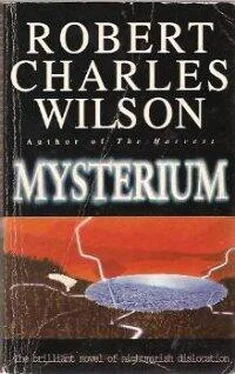She said, “Even the scholars from outside. I don’t think they mean to let us leave. We’ve seen too much and we’re too likely to talk about it.”
Dex said, “We’ll get out. A few lives saved is probably the best we can hope for.” He shrugged into his jacket. She said, “Where are you going now?”
“Unfinished business. I’m going to look for Howard Poole.”
“Let me come with you.”
He thought about it. “There’s another jacket in the closet. Leave yours here. And keep a scarf around your head. I don’t want us to be recognized.”
∞
She walked beside him in the street, head down, her arm in his. She was small and perfect, Dex thought, and probably doomed, like everybody else in these quiet winter houses.
So much had become clear in the last few days—Howard didn’t know how to begin to tell Dex.
Dex had come out of a cold afternoon without warning. He brought a woman with him: Linneth Stone, an outsider but not a Proctor, Dex said. “You can talk in front of her. She’s an academic, Howard—she has tenure.”
He looked at her. “What’s your subject?”
“Cultural ethnology.”
“Oh. Kinship systems. Yuck.”
“Howard’s a physicist,” Dex said.
“Oh,” Linneth said. “Atomic particles: Yuck.”
But the news was more important than all this. Howard turned to Dex and said, “Listen, I found her.”
“Her?”
“The woman Stern was living with. She’s only a couple of blocks away. And she has all his notes.”
“Howard, that doesn’t matter now.”
“But it does. It matters a lot.”
Dex exchanged a look with Linneth, then sighed. “All right,” he said. “Tell me what you found out.”
∞
Stern wasn’t the only physicist obsessed with God. Think about Einstein’s objection to quantum theory, or Schrodinger’s notion of the hidden unity of the human mind. If you look hard enough at the cosmos, Howard said, all these metaphysical questions emerge— religious questions.
But Stern’s obsession was much stranger than that. He had been God-haunted from his earliest childhood, driven by what could only be called a compulsion: by dreams or visions or maybe even a hidden physical problem: a tumor, temporal-lobe epilepsy, borderline schizophrenia. Stern had studied the world’s religious texts for clues to a mystery that must have seemed omnipresent, urgent, and taunting… the mystery of what might lie beyond the borders of human knowledge.
He had looked for answers with equal vigor in Einstein and the Talmud, in Heisenberg and Meister Eckehart. Physics gave him a career, but he never set aside his volumes of esoterica. He had been especially fascinated by the wild cosmogonies of the early Christian Gnostics, creation myths cobbled together from fragments of Judaism, Hellenic paganism, eastern mystery religions. In the flourishing mystical thought of the late Roman Empire Stern had perceived a fertile metaphor for the universe behind the quantum and before creation.
“He must have been a brilliant man,” Linneth said.
“Terrifyingly brilliant. A little scornful of his colleagues. He was capable of eccentric behavior—he never wore any clothes but jeans and T-shirts, even when he accepted the Nobel prize. But he had the brains to get away with it.”
“Intimidating,” Linneth said.
“Always. It was part of his shtick. It made him a reputation. And it was his reputation that brought him here.”
Dex said, “I’m surprised he accepted government work.”
“He didn’t want to. Especially during the Cold War, government research was often the equivalent of dropping into a black hole. If your work is classified, you can’t publish, and if you can’t publish, it ain’t science. But they made him an offer he couldn’t refuse. They promised him a long look into the heart of the mystery.”
Howard described the Turkish fragment, an object so defiantly strange that it beggared comprehension.
“You can imagine how it fed Stern’s obsessions. By day he took measurements and made cautious, rigorous hypotheses. By night he installed himself in the study in Ruth Wintermeyer’s house and composed rambling notes about the Plenum, the fragment as a divine artifice, literally a piece of the Appennoia. The journal he left is partly autobiography, partly scientific chronicle, partly the ravings of a lunatic. He was losing the ability to distinguish speculation from fact. It all became one thing, the mysterium tremendae —the outer limit of rational thought.”
Linneth said, “But ultimately, did he discover what the fragment was?”
“Not with any certainty. He came to believe it was a piece of what he called a ‘wormhole boat.’ ”
“Wormhole?”
“Call it a device for traveling between parallel worlds. But that rests on some highly speculative physics and a lot of Stern’s own bizarre ideation. He did prove one interesting thing—that the fragment responded in minute but detectable ways to the proximity of living beings. It knew when someone was close, in other words. Stern took this as evidence for another of his pet notions, that consciousness is tied to reality in some way more profound than we generally suppose. Whether it really proved any such thing is questionable, of course.”
“And the accident?” Dex asked.
“Ah. Interesting. There’s no way to reconstruct it from his notes, but he was talking about pouring radiation into the fragment to see how it responded. He had these enormous power lines installed. Ultimately, I guess he provoked a bigger response than he anticipated. Crossed some threshold.”
“And brought us here?”
“Yes.”
“You mean, personally!”
“Well,” Howard said, “it’s a puzzle, but the pieces are in place. The fragment responds to Stern’s presence—to his mind, Stern would claim. He applies a tremendous amount of energy and some kind of catalysis takes place, and in some unimaginable way, we’re transported here. But more than that. I think the process isn’t finished. It’s still happening.”
“I don’t understand.”
“Isn’t it obvious? The lab is still enclosed in that dome of light. And think about what happened when the filling station caught fire. Energy was liberated, and it took a strange form. People saw God or the Devil, but to me—” He looked at the table, then raised his eyes defiantly. “To me it looked like Stern himself.”
∞
Howard’s reasoning had gone deeper than he wanted to admit.
From the scant evidence in the journal he had decided that Stern might be right: the fragment was part of a device meant to cross between avenues of creation, the infinite universes of Linde or the multiple alternatives of the uncollapsed wave function—or, somehow, both. And it had interacted with human consciousness, with Stern himself.
It was a boat, and Stern had become its pilot, had taken this piece of northern Michigan with him into a world that echoed, but imperfectly, all his stubborn obsessions.
He pictured Stern as a lingering presence inside the ruined lab, preserved somehow … as alive as he had seemed in Howard’s dreams.
“When the Proctors were investigating the lab, they sent people inside in protective clothing. It must have helped, if only a little. I want to get hold of one of those suits.”
“Howard, that’s ludicrous,” Dex said. “What could you possibly achieve?”
He hesitated. Did it make sense to say that he knew he should do this? Not only that he wanted to but that he felt asked to? Compelled to?
“I can’t explain it,” he said finally, “but I have to try.”
Читать дальше












